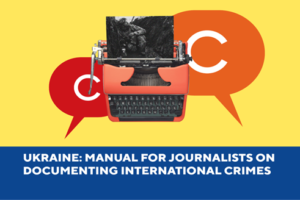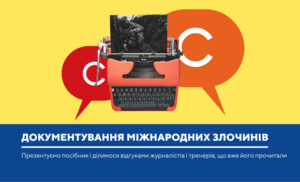[Текст українською йде далі]
 11 September 2023.
11 September 2023.
The Centre for Law and Democracy (CLD) has developed a detailed Manual for Journalists on Collecting and Preserving Information About International Crimes, along with a short pamphlet, Preserving Information for International Criminal Convictions: A Pocket Guide for Journalists. The week before last, we issued a statement about the training we provided in collaboration with our local partner, the Regional Press Development Institute (RPDI), and based on the Manual. We are now launching the Manual itself, along with the Guide, in English and Ukrainian. This programme aims to help journalists, especially those reporting from the frontlines, recognise when international crimes have been committed and how to take some simple steps to capture pertinent information so that it can be used for both reporting and judicial proceedings.
“While the Manual was designed primarily as a support document for the formal training programme we have developed, we hope it will also be useful as a stand-alone resource”, said Toby Mendel, Executive Director of CLD. “International criminal law is a complex area of law, as is the law of evidence, but hopefully the Manual will give readers the basic knowledge and skills they need in this area.”
The Manual is divided into four main sections providing, respectively, an overview of international crimes, a focus on crimes against journalists, a review of practical steps that can be taken to document crimes so that the information can be used for criminal justice purposes and a final section setting out some additional resources. Although the Manual was specifically designed for Ukraine, the core material is relevant to other situations, so we encourage those with an interest in this from anywhere in the world to have a look at it.
Kyrylo Ovsyany, journalist with Radio Liberty’s programme Schemes: Corruption in Detail, who took part in the training programme, shares his views: “The Manual should be read at least once by every journalist who works with war reporting. It will help to have a better understanding of the legal issues involved and will explain what details need to be paid extra attention to.”
Yevheniya Motorevska, who also joined the training and leads the war investigations department of The Kyiv Independent, is convinced that the Manual “gives an understanding of the key principles of the International Criminal Court. And also explains how to correctly record shelling of cities, killings of civilians and soldiers, looting, etc., so that these facts can be used in international courts in the future. Special thanks to the authors and translators for using ordinary language terms and providing detailed explanations.”
Liudmyla Pankratova, Regional Press Development Institute Executive Director and one of the trainers on the ground, notes: “The training course and the Manual are extremely useful not only for Ukrainian reporters. It is a simple, convenient and, most importantly, an effective tool that allows you to understand and distinguish war crimes in order to document them. And the collected information can be added to the materials of the International Criminal Court. I believe that the application of the Manual will seriously increase opportunities for journalists to gather evidence of appropriate quality. Documenting war crimes in Ukraine is a job that is our responsibility, because no one knows better and has more access to such unique and important information than us.”
The Manual is available here in English and Ukrainian and the Guide is available here in English and Ukrainian. For those interested, we can also share the slides we used for the training upon request.
For further information, please contact:
|
Toby Mendel |
Oksana Maksymeniuk |
Документування міжнародних злочинів: презентуємо посібник для журналістів
 11 вересня 2023 р.
11 вересня 2023 р.
Центр права та демократії розробив детальний “Посібник зі збору та зберігання інформації про міжнародні злочини”, а також коротку брошуру “Зберігання інформації для міжнародних кримінальних вироків: кишеньковий посібник для журналістів”. Два тижні тому ми вже розповідали вам про тренінґ, який ІРРП провів у співпраці з нашими канадськими колегами. Тепер власне презентуємо документи англійською та українською мовами. Програма, в рамках якої проводили навчання, має на меті допомогти журналістам, особливо тим, хто працює на передовій, розпізнавати міжнародні злочини й не лише висвітлювати їх, а й фіксувати у форматі, який приймуть під час судового розгляду.
“Якщо посібник і розробляли як супровідний документ для тренінґової програми, ми сподіваємося, він буде корисним й автономно, – каже Тобі Мендель, виконавчий директор Центру права та демократії. – Як і доказове, міжнародне кримінальне право є складною галуззю, проте маємо надію, що посібник надасть читачам базові знання та навички, яких вони потребують”.
Документ містить чотири головні секції: огляд міжнародних злочинів; фокус на злочинах проти журналістів; практичні кроки з документування інформації, що уможливлять їхнє використання для цілей кримінального правосуддя; та фінальний розділ про додаткові ресурси. Посібник спеціально розробляли для України, проте основний матеріал може бути актуальним і в інших ситуаціях. Тож ми заохочуємо зацікавлених із усього світу ознайомитись із запропонованими матеріалами.
Кирило Овсяний, журналіст програми “Схеми: корупція в деталях”, Радіо Свобода, узяв участь у тренінґовій програмі й ділиться враженнями: “Посібник варто хоча б раз прочитати кожному журналістові, що працює з висвітленням воєнних злочинів. Це допоможе краще розуміти специфіку роботи юристів та пояснить, на які деталі потрібно звертати додаткову увагу”.
Євгенія Моторевська, що також приєналася до навчання й очолює відділ воєнних розслідувань видання “The Kyiv Independent”, переконана, що посібник “дає розуміння ключових принципів роботи Міжнародного кримінального суду. А також пояснює, як правильно фіксувати обстріли міст, убивства цивільних і військових, мародерства тощо, щоби ці факти могли в майбутньому використати в міжнародних судах. Окрема подяка авторам і перекладачам за “людську” мову та доступні пояснення”.
Людмила Панкратова, виконавча директорка Інституту розвитку регіональної преси, зазначає: “Навчальний курс і посібник є надзвичайно корисними не лише для українських журналістів. Це простий, зручний і головне – ефективний інструмент, який дає змогу розібратися й розрізнити воєнні злочини для того, щоби задокументувати їх. А зібрану інформацію можуть долучити до матеріалів МКС. Вважаю, що застосування посібника серйозно збільшить можливості журналістів у зборі доказів належної якості. Документування воєнних злочинів в Україні – це робота, яка є нашим обов’язком, оскільки ніхто, крім нас, не знає краще та не має більшого доступу до такої унікальної та важливої інформації”.
Посібник доступний українською й англійською мовами, а з порадником можна ознайомитися тут. Будемо раді поділитися слайдами презентації, яку демонстрували на тренінґу.
Із будь-яких питань щодо проєкту контактуйте із:
|
Тобі Менделем, |
Оксаною Максименюк, |



